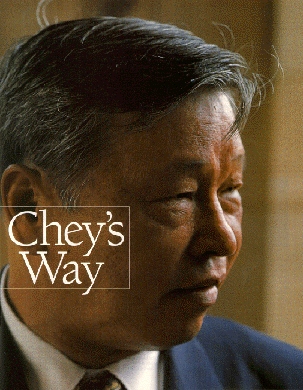 The University of Chicago Magazine August 1995
The University of Chicago Magazine August 1995

CHEY JONG HYON COULD BE CALLED the John D. Rockefeller of South Korea, because he has made a fortune from oil. Or he could be compared to Thomas Watson, for he has created a corporate culture and management style that rivals the IBM of old. Or he might be Korea's answer to E. F. Hutton: When he talks, as the famous advertisement goes, people listen.
But Chey--who returned to campus this June to receive the University's 1995 Alumni Medal--is unlike any of these men. Partly this is because South Korea's business world is so different from that of the U.S., with the Korean economy heavily influenced by a handful of huge, family-controlled conglomerates, called chaebol. A single chaebol usually makes everything from computer chips to chocolate chips, from sneakers to skyscrapers.
And it is partly because Chey himself, chairman of Korea's Sunkyong Group, resists comparison. He is a blend of cordiality and bluntness, of calculation and audacity, of Western education and Eastern learning. His career can sometimes seem like an attempt to reconcile two different approaches to life, to navigate "the middle way" of Confucius.
That middle way has sometimes made him the odd man out. For example, Chey's favorite sport is tennis. But in Korea, as in the rest of the world, the sport of CEOs is golf--probably because it's easier to exchange market tips between holes than between sets. Chey doesn't particularly like golf, "but because all my friends go to the golf course nowadays, I had to join a club."
Now he can play tennis on the club's courts. It is a characteristic place for Chey, AM'61: a member of the club, yet not quite part of the group.
His company finds itself in a similar position. Sunkyong is Korea's fifth largest chaebol (rhymes with "play ball"). With 1994 sales of Won 14.7 trillion ($18.6 billion), it's one of the country's most prominent business groups, and would easily make the top tier of the U.S. Fortune 500. But Sunkyong has some important differences from its rivals.
More than most Korean chaebol, Chey's conglomerate relies on the expertise of professional managers instead of family members. (Chey and his wife, Kae Hee, who met at International House, have two sons and a daughter. Both sons--including Tae Won, who did graduate work in economics at Chicago--work for Sunkyong affiliates, while his daughter, Keewon, AM'91, studies music.) In the range of its interests, Sunkyong is not as scattered as some chaebol. And it has employed some very Western business practices.
Early on, Chey says, he decided that Western ways "are quite efficient in marketing and production," so he adopted them. At the same time, he says, Western management "is not quite successful in using its human resources." To motivate people, he believes, "the Oriental way of thinking is more useful."
So Chey endeavors to strike a balance: "It just seems that's the best way to go, because that's what reality is," he says. Sunkyong is not a Korean company, he notes; it is a global company that happens to be based in Seoul. New employees are required to undergo a ten-day overseas training program to familiarize themselves with another culture. The group has some five dozen overseas offices, on every continent except Antarctica.
More than half of the group's sales--and an even greater share of its profits--come from one subsidiary, Yukong, which controls 37 percent of Korea's oil-refinery market. But Sunkyong's businesses also include construction, trading, textiles, telecommunications, computer disks, supermarkets, financial services, and a hotel. In the last decade, the company has grown from 19 affiliates with total assets of less than Won 3 trillion to 32 subsidiaries and assets of Won 12.8 trillion.
To Kim Il Sup, a partner at Samil Accounting in Seoul and author of several books on Korean management, the reason for Sunkyong's phenomenal success is simple: "Chairman Chey is a very good manager," he says. "He made his company grow through his foresight, his drive."
CONTINUE READING "CHEY'S WAY"